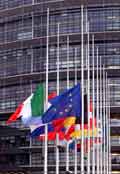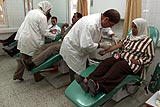|
World Reaction
U.S. Allies Offer Support, Vow to Fight Terrorism
 Listen as NPR's Julie McCarthy reports from London Listen as NPR's Julie McCarthy reports from London
 Listen as NPR's Jennifer Ludden reports from the Middle East Listen as NPR's Jennifer Ludden reports from the Middle East
 | |
Flags of member states of the European Union fly at half staff in front of
the building of the European Parliament.
Image © Reuters/Vincent Kessler 2001
|
Sept. 13, 2001 -- NATO and the European Union are closing ranks behind the United States in the aftermath of Tuesday’s terrorist attacks in New York and Washington, D.C. In a show of support in Brussels, Belgium, on Wednesday, the U.S.’s NATO allies said the assaults could be considered an attack on the whole alliance if they were directed from abroad.
Referring to the decision to invoke Article 5 of the NATO charter for the first time in the history of the Atlantic Alliance, NATO Secretary General Lord Robertson said that: "An attack on one is an attack on all." Article 5 obliges the other allies to provide collective assistance – including, if needed, a military response and access to air bases and allied airspace -- to a NATO country that has been attacked from abroad.
Also in Brussels, European Union foreign ministers pledged Wednesday to help U.S. authorities track down and punish those responsible for the assault. At an emergency meeting, they also declared Friday a day of mourning in the 15-member bloc in solidarity with the United States. The attacks, they said, were “not only on the United States, but against humanity itself and the values of freedom we all share.”
 | |
Palestinians donate blood in Gaza hospital for
victims of Tuesday's attacks in the United States. Palestinians
said they sympathized with the U.S. victims, despite their criticism of U.S. support for Israel.
Image © Reuters/Ahmed Jadallah 2001 |
The EU also offered immediate help in search and rescue efforts, medical assistance, and cooperation in the fight against terrorism. A team of 10 Belgians with experience in identifying victims and treating burn victims has already left Belgium, and other EU states have relief teams on standby if needed.
The official press agency in Saudi Arabia is reporting that that country has also offered its full cooperation to the U.S. in fighting terrorism in the wake of Tuesday’s attacks.
Other repercussions are being felt in Europe and elsewhere. In Germany, government offices are on high alert after bomb threats against the foreign ministry in Berlin and the tallest skyscraper in Frankfurt prompted the evacuation of both buildings. Security remains tight at major European airports and at NATO headquarters, and Americans abroad are being advised to keep a low profile.
With the U.S. stock market closed Thursday, international financial markets were calm amid thin trading. On Wednesday, world central banks -- among them the European Central Bank, the Swiss National Bank, the Bank of Japan and the Federal Reserve -- injected some $120 billion into the system in an attempt to prop up investor confidence. But it was not business as usual. Stock exchanges in London, Frankfurt and other European cities went still Wednesday afternoon as they observed a minute of silence in respect for the victims.
Meanwhile, European firms with offices in the trade towers are still trying to tally their human losses. The United Kingdom says that at least 100 of its nationals are missing, and countries such as Belgium and Portugal have set up hotlines for people searching for news of family members or friends.
In the Middle East, where reactions to the bombing were mixed, Palestinian leader Yasser Arafat donated blood for the victims, while other Palestinians and Israelis held vigils to show sympathy with the United States. A day earlier, some militant Palestinians in Jerusalem, angry at U.S. policy in the Middle East, had taken to the streets in celebration.
In Afghanistan, the Taliban -- the fundamentalist Islamic group is thought to be harboring exiled Saudi billionaire Osama bin Laden, the mastermind believed to be behind the bombing of the U.S. embassies in Africa in 1998 and a prime suspect now -- condemned the attacks and said that Osama bin Laden was forbidden to use the country as a base for terrorism. Cuba also criticized the terrorist acts.
For security reasons, Western aid workers have begun pulling out of Afghanistan, and the United Nations is temporarily closing down its office there.
|